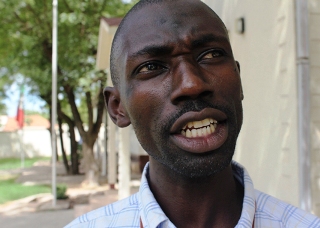Activist urges AUPSC to push for Hybrid Court on S. Sudan
April 14, 2018 (JUBA) – The African Union Peace and Security Council (AUPSC) should push for the establishment of the Hybrid Court to try the different crimes committed during the civil war, an activist said.

“[The] AUPSC should make strong action-oriented positions on the ongoing violations of the cessation of hostilities agreement signed on 21st December, 2017, compromises during HLRF [High Level Revitalization Forum], establishment of a Hybrid Court and the negative interference of some AU members’ states on HLRF process,” said Edmund Yakani, a South Sudan civil society activist.
He added, “The ongoing violations of CHoA [Cessation of Hostilities Agreement] are weakening the public trust and confidence that the negotiating parties of South Sudan have and the will to accept peaceful settlement of their political difference”.
The AUSPC team is in Juba, the South Sudan capital to discuss to discuss the situation in five year old civil in the East African country.
The meeting is within the time frame where the regional bloc’s special envoy to South Sudan is conducting shuttle diplomacy with various South Sudan actors on ongoing peace mediation processes.
Yakani, however, said the meeting in the South Sudan capital is timely in terms of pushing and lobbying South Sudan negotiating parties for compromises on the registered deadlock on the road to revitalize the Agreement on Resolution of Conflict in South Sudan.
“The AUPSC meeting in Juba should not ignore matters of estrange and hostile political relation among the principals and the negotiating parties, “ stressed Yakani, adding that “Building consensus among the principals of the negotiation parties besides their personal political grievance is essential for the success of next High-Level Revitalization Forum in later April 2018 in Addis Ababa”.
He also called for support for national media coverage of next HLRF as a strategy of bui1ding d citizens ownership, trust and confidence on the outcomes of HLRF and that the AUPSC team should meet with others stakeholders, including faith-based leaders, members of the civil society, women and youth during their six-day visit to Juba.
(ST)
